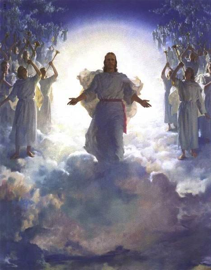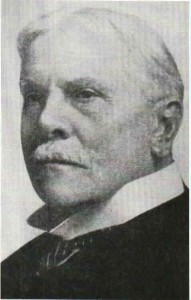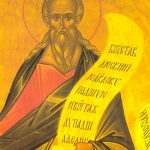“Rapture” Theology
 From time to time, Christian End Times speculation heats up again. The latest wave of interest began with John Hagee’s pronouncements about the Blood Moons. No doubt it will be fueled further by the re-making of the Left Behind movies — now starring Nicolas Cage.
From time to time, Christian End Times speculation heats up again. The latest wave of interest began with John Hagee’s pronouncements about the Blood Moons. No doubt it will be fueled further by the re-making of the Left Behind movies — now starring Nicolas Cage.
I’m old enough to remember the Larry Norman song “I Wish We’d All Been Ready” (used extensively in evangelism) and the evangelistic film churches used to show “A Thief in the Night.” Then after all that, I also remember the brief furor that was caused by a booklet that gave 88 reasons why Jesus was returning in 1988. More recently, Harold Camping predicted Jesus’ return on May 21, 2011. Over the years, many of the predictions of end-times prophecy teachers have failed — some quite spectacularly — but, this is quickly forgotten when a new round of predictions starts up again.
The doctrine of the Rapture has been a staple of American fear-evangelism for a long time. In this teaching, Jesus will return secretly to remove all true Christian believers from the world — then a time of horrible Tribulation will ensue. And, it is still commonly taught by certain well-known “prophetic” teachers.
Evangelical and conservative Christians pride themselves on their devotion to the Bible. Yet, there are certain common features of conservative Christian teaching about the return of Christ which have little or no backing from the Scriptures. Specifically, the teaching that Christ will come silently and secretly to take believers out of the world, seven years before he returns in glory, is a teaching the lacks Biblical support.
This concept of the “Rapture” has been a characteristic feature of conservative and evangelical Christian theology for a long time now. This doctrine teaches that the true Christian believers will be removed from the world just before (or maybe within) a period of earthly Tribulation. This removal of Christians from the world is an event they call the Rapture. And, this teaching has become not only a standard feature of conservative Christianity, but also a phenomenon in our wider culture through the best selling Left Behind books. Actually, the commonly-held doctrine of the Rapture is a feature of the Dispensational theological system. This system of thought begun with John Nelson Darby (1800-1882).
But, it was later was popularized in the early part of the 20th Century by C. I. Scofield and the extremely successful Scofield Reference Bible, first published in 1909.
Dispensational theology, with its distinctive doctrine of “two comings” of Christ, is a 19th Century doctrinal innovation. It arose, I think, in response to growing pressure to see and interpret the Bible in light of its own history. Dispensationalism by-passed a historical approach to Scripture by (a.) interpreting the Bible in a strict literalistic sense, (b.) dividing the Bible history into dispensations in which God dealt with the world on different principles, (c.) asserting a strict dichotomy between Israel and the Church. Thus, in Dispensationalism, there was no need to appeal to history or to a notion of Progressive Revelation. Bible books belonging to a previous dispensation did not directly relate to the present dispensation of grace. (You start to see some of the problems here when you consider that the teaching of Jesus itself, would, from this point of view, belong to a previous dispensation.)
Most people who have been trained in Biblical studies and theology believe the Dispensational schema to be false. You can find several refutations on the Internet. While the faculty of Dallas Theological Seminary defends this point of view (though sometimes in a significantly modified form from the teachings of Darby and Scofield), very few academic theologians defend this view, or even take it seriously.
It is generally ignored in major theological Seminaries. It is never even mentioned.
And that’s too bad. It is very much a “live” theological option out in the real world, whatever professional theologians may think of it.
I think this is some sort of academic-theology ego thing. Theology teachers need to get out of their ivory towers and mix with real folks once in a while. Dispensationalism is a live option out in the church and in our culture even though its academic-theology credentials are… um, … not so good. It sells a lot of books. More people read stuff like the Left Behind books (or the Da Vinci Code, for that matter) than read respected academic theology.
Besides, academic theology is hard to read! Yes, I much admire Wolfhart Pannenberg and Jürgen Moltmann (and many other Systematic and Biblical theologians). But, the writings of academic theologians are generally not accessible to average (or even in some cases, the above-average) lay reader. By contrast, Tim LaHaye has always written for the masses. Academic theologians tend to see Dispensationalism as beneath contempt, but that stance is arrogant — and it is not been helping the church at large. The rest of us encounter it quite commonly.
Like it or not, Dispensationalism is the dominant eschatology of our day — at least in the United States. And what it tends to say to people is this: The world is going to the Devil (and his minion, the Antichrist) and if we are fortunate enough to be believers we will be “bailed out” by the Rapture before things get too awfully bad. No need to improve things on this evil world. It’s going to the Devil anyway.
And, it has spilled over from Christianity to our secular culture, as well. The dominant secular “eschatology” is a vision of a bleak future: an overcrowded, oppressive world — or the world decimated by plague — or maybe nuclear holocaust and its aftermath.
It was a long time ago that Jürgen Moltmann wrote about the Theology of Hope. it needs to be taken seriously! But the eschatology of gloom, doom, and despair is very much ingrained into our churches and our culture. This is the mythos of our age.
The pre-tribulational Rapture theory is, as I have said, the Dispensational view. In this view, all of salvation history is divided into Dispensations in which God worked in significantly different ways. The Dispensational view is an approach to the interpretation of the Bible that avoids historical & cultural & literary questions. Thus, it has a certain amount of appeal to folks who do not wish to see the Bible as having been historically & culturally conditioned by its times.
Any particular Bible verse is simply located within its proper Dispensation. God worked in different ways at different times. So, for example, God doesn’t call us to slaughter Canaanites anymore, that was the Word of God to Joshua and appropriate to a previous Dispensation when God was working in a different way. And so forth. (In the older Dispensational theory there were 7 dispensations in which God worked in a distinctively different way. Some of that has changed.) Thus, the Dispensational theory has an attraction to folks who hold to a more Literal-Dictation view of the Scriptures, since it irons out what might otherwise be seen as discrepancies in the Bible’s teachings. But, people who adopt a historical approach to the Bible have no need of the Dispensational theory.
The most fatal flaw in this is that the Dispensational theory is nowhere explicitly taught in the Bible itself. It’s advocates argue that the theory is needed in order to understand the Bible properly. Dispensational Baptist preacher H. A. Ironside called this “rightly dividing the Word of Truth.” But, how can they claim that this is necessary when it is nowhere explicitly taught in the Scriptures themselves? If this is so important why didn’t Jesus (or, failing that, the apostle Paul, at least) clearly spell this out? The great irony here is that people who proclaim that their theology is based in the Bible alone actually depend upon an extra-biblical theory of interpretation to give their view coherence.
And — worse yet! — the centerpiece of this theory, the Pre-tribulational Rapture is nowhere explicitly taught in the Bible itself.
Detailed support for the above affirmation follows.
 1. THE OLIVET DISCOURSE. (Mark 13, Matthew 24 & 25, Luke 21.) Jesus is giving instruction to his disciples here about the coming crisis in Jerusalem and about the end of time. Nowhere in this passage does he in any way hint of a “pre-trib rapture.” Quite the contrary! Rather than giving them assurance that they will be exempted from any tribulations that lie ahead, he is giving them warning about tribulations and seductions they will have to endure in the times to come. For example, notice this:
1. THE OLIVET DISCOURSE. (Mark 13, Matthew 24 & 25, Luke 21.) Jesus is giving instruction to his disciples here about the coming crisis in Jerusalem and about the end of time. Nowhere in this passage does he in any way hint of a “pre-trib rapture.” Quite the contrary! Rather than giving them assurance that they will be exempted from any tribulations that lie ahead, he is giving them warning about tribulations and seductions they will have to endure in the times to come. For example, notice this:
“Pray that this will not take place in winter, because those will be days of distress unequaled from the beginning, when God created the world, until now — and never to be equaled again. If the Lord had not cut short those days, no one would survive. But for the sake of the elect, whom he has chosen, he has shortened them. At that time if anyone says to you, ‘Look, here is the Christ!’ or, ‘Look, there he is!’ do not believe it. For false Christs and false prophets will appear and perform signs and miracles to deceive the elect — if that were possible. So be on your guard; I have told you everything ahead of time.” (Mark 13:18-23 NIV).
The expectation here is that Christ’s followers will endure tribulation. Jesus tells them: “…[the one] who stands firm to the end will be saved.” (Mark 13:13 NIV). If exemption from the tribulations of the last days were the expectation (as it is among Christians in our day) this would have been a great place for Jesus to say so.
He says the opposite.
It appears from the Olivet Discourse that the time when Jesus will gather his followers to himself will also be the time of judgement upon the world.
“At that time the sign of the Son of Man will appear in the sky, and all the nations of the earth will mourn. They will see the Son of Man coming on the clouds of the sky, with power and great glory. And he will send his angels with a loud trumpet call, and they will gather his elect from the four winds, from one end of the heavens to the other.” (Matthew 24:30-31 NIV).
It appears from this passage that the time of judgement upon the world will be the same as the time of the gathering the elect. In fact the Judgement aspect of Jesus coming (“all the nations of the earth will mourn”) is mentioned first. If the so-called Rapture and the time of Judgement were two different things, again, this would be a great place to say so. Again, it says the opposite. There is nothing here that teaches, implies, or even hints at a silent, secret Rapture of the Saints.
![]() 2. THE THESSALONIAN LETTERS. (1 & 2 Thessalonians)
2. THE THESSALONIAN LETTERS. (1 & 2 Thessalonians)
The passage generally cited for a “pre-trib rapture” is 1 Thessalonians 4:13-18:
“Brothers, we do not want you to be ignorant about those who fall asleep, or to grieve like the rest of men, who have no hope. We believe that Jesus died and rose again and so we believe that God will bring with Jesus those who have fallen asleep in him. According to the Lord’s own word, we tell you that we who are still alive, who are left till the coming of the Lord, will certainly not precede those who have fallen asleep. For the Lord himself will come down from heaven, with a loud command, with the voice of the archangel and with the trumpet call of God, and the dead in Christ will rise first. After that, we who are still alive and are left will be caught up together with them in the clouds to meet the Lord in the air. And so we will be with the Lord forever. Therefore encourage each other with these words.” (1 Thessalonians 4:13-18 NIV).
This might seem to accord with the Dispensational view, but upon closer examination it doesn’t. Notice the very next sentences:
“Now, brothers, about times and dates we do not need to write to you, for you know very well that the day of the Lord will come like a thief in the night. While people are saying, “Peace and safety,” destruction will come on them suddenly, as labor pains on a pregnant woman, and they will not escape. But you, brothers, are not in darkness so that this day should surprise you like a thief.” (1 Thessalonians 5:1-4 NIV).
So, Paul’s teaching here is similar in structure to Jesus’ teaching. The time of being caught up together with the Lord is the same as the time of Judgement upon the world. Jesus return is spoken of as being like a “thief in the night” not because it is silent or secret, but because it is unexpected.
The same phenomenon can be noticed in 2 Thessalonians. The time when Christ is going to come for his people is spoken of as being the same time as when judgement comes upon the world:
“All this is evidence that God’s judgment is right, and as a result you will be counted worthy of the kingdom of God, for which you are suffering. God is just: He will pay back trouble to those who trouble you and give relief to you who are troubled, and to us as well. This will happen when the Lord Jesus is revealed from heaven in blazing fire with his powerful angels. He will punish those who do not know God and do not obey the gospel of our Lord Jesus. They will be punished with everlasting destruction and shut out from the presence of the Lord and from the majesty of his power on the day he comes to be glorified in his holy people and to be marveled at among all those who have believed. This includes you, because you believed our testimony to you.” (2 Thessalonians 1:5-10 NIV).
Then notice this a little way further:
“Concerning the coming of our Lord Jesus Christ and our being gathered to him, we ask you, brothers, not to become easily unsettled or alarmed by some prophecy, report or letter supposed to have come from us, saying that the day of the Lord has already come. Don’t let anyone deceive you in any way, for [that day will not come] until the rebellion occurs and the man of lawlessness is revealed, the man doomed to destruction.” (2 Thessalonians 2:1-3 NIV).
This passage says explicitly that “the coming of our Lord Jesus Christ” and “our being gathered to him” cannot occur until “the rebellion” (often identified with the “great tribulation” spoken of in the Synoptic Gospels) occurs first, and the “man of lawlessness” (often identified with the Antichrist spoken of in the letters of John) is revealed. This passage actually seems to disallow the possibility of a pre-trib Rapture (though I will acknowledge the great and imaginative efforts of Dispensational interpreters down through the years to make this somehow conform).
 3. THE BOOK OF REVELATION. Nothing in the Book of Revelation itself necessitates the Pre-trib view. It is nowhere taught, though it has been read into some passages.
3. THE BOOK OF REVELATION. Nothing in the Book of Revelation itself necessitates the Pre-trib view. It is nowhere taught, though it has been read into some passages.
“After this I looked, and there before me was a door standing open in heaven. And the voice I had first heard speaking to me like a trumpet said, “Come up here, and I will show you what must take place after this.” (Revelation 4:1 NIV).
This is simply a transition in John’s visions. it is an experience that happened to John. I suppose it could be a pre-trib Rapture, but there is no reason to think that it is. The doctrine is being read into the passage.
There are numerous places in the Book of Revelation where the people of God are spoken of as enduring the tribulations of the Last Days. The oft-repeated maxim of the New Testament is “[the one} who stands firm to the end will be saved.”
“After this I looked and there before me was a great multitude that no-one could count, from every nation, tribe, people and language, standing before the throne and in front of the Lamb. They were wearing white robes and were holding palm branches in their hands. And they cried out in a loud voice: “Salvation belongs to our God, who sits on the throne, and to the Lamb.” All the angels were standing round the throne and around the elders and the four living creatures. They fell down on their faces before the throne and worshipped God, saying: ‘Amen! Praise and glory and wisdom and thanks and honor and power and strength be to our God for ever and ever. Amen!’ Then one of the elders asked me, ‘These in white robes — who are they, and where did they come from?’ I answered, ‘Sir, you know.’ And he said, ‘These are they who have come out of the great tribulation; they have washed their robes and made them white in the blood of the Lamb.’” (Revelation 7:9-14, NIV.)
Notice that the great multitude “from every nation, tribe, people and language” came out of “the great tribulation” — that is to say, they endured it (okay, or at least, part of it).
“He [the beast from the sea] was given power to make war against the saints and to conquer them. And he was given authority over every tribe, people, language and nation.” (Revelation 13:7 NIV)
“If anyone is to go into captivity, into captivity he will go. If anyone is to be killed with the sword, with the sword he will be killed. This calls for patient endurance and faithfulness on the part of the saints.” (Revelation 13:10 NIV.)
“This calls for patient endurance on the part of the saints who obey God’s commandments and remain faithful to Jesus.” (Revelation 14:12 NIV.)
“I saw that the woman was drunk with the blood of the saints, the blood of those who bore testimony to Jesus. When I saw her, I was greatly astonished.” (Revelation 17:6 NIV.)
To summarize:
- the Bible does not generally separate the “gathering together” and “judgement” aspects of Jesus’ Return
- the New Testament does not clearly promise that the “saints” or the “elect” will have any exemption from the tribulations of the last days,
- many passages in the New Testament are given to prepare the followers of Christ for times of tribulation,
- the pre-trib Rapture doctrine is an implication of the Dispensational theory of biblical interpretation (the current crop of believers must leave the earth at the next major Dispensational shift, so that God can return to working with Israel again) and has no basis in the Bible without it.
While, with great effort the relevant passages can be made to conform to the Dispensational view, they need not be read that way. In certain cases, the Dispensational view seems to run directly counter to the more natural sense of the passages in question.
Or, to put it more succinctly: The Pre-Tribulational Rapture is not a biblical doctrine.
And, the burning question for our day is: how do we recover the New Testament concept of Hope? How can we teach a credible doctrine of Hope for our generation?
It might begin by refusing to pay attention to the latest round of End Times speculation and furor.
















Thank you for this great article! I grew up in a Baptist church, raised by parents (especially my mother) obsessed by the end times. I had never questioned the rapture, until my bible study group decided to study Revelations. (Ironically, we used a Tim LaHaye book–and we found many things he claimed just aren’t scriptural). The Olivet discourse bothered me, and I really started digging in to the scriptures. I came to the same conclusion as you, that a pre-Tribulation rapture just isn’t biblical. I’m kind of a black sheep of the family now! So, it’s a blessing to see a well thought article with scriptural evidence backing you up.
You are welcome. I’m glad to be an encouragement to you.
SCRIPTURES THAT DESTROYS THE PRETRIBULATION RAPTURE DOCTRINE:
Rev. 21:9 is about The New Jerusalem, the Bride, the Wife (Married already) of the Lamb (this is after the end of the Millennium, and start of the New Heaven and New Earth)
9 ONE OF THE SEVEN ANGEL who had the SEVEN BOWLS full of the SEVEN LAST PLAGUES came and said to me, “Come, I will show you the BRIDE, the WIFE of the LAMB.”
(I hope we don’t have another bride in mind, like what pretribbers did to Matthew 24:29,30, making it the second rapture/resurrection, which they say is still an integral part of the first resurrection of Rev. 20. Jesus will get His Bride one time only, not several times)
Question:
Why does it have to be ONE OF THE SEVEN ANGELS WHO HAD THE SEVEN BOWLS, after he had done his tasked a thousand years ago, be the one appointed by Jesus to show to John the Bride? Why not one of the seven angels who had the trumpets, or Michael, or Gabriel, or any other Angels? Have you wondered why is this angel worth mentioning in introducing the Bride to John?
Answer:
Checkout Rev. 16:12-15
12 THE SIXTH ANGEL POUR OUT HIS BOWL on the great river Euphrates, and its water was dried up to prepare the way for the kings from the East. 13 Then I saw three impure spirits that looked like frogs; they came out of the mouth of the dragon, out of the mouth of the beast and out of the mouth of the false prophet. 14 They are demonic spirits that perform signs, and they go out to the kings of the whole world, to gather them for the battle on the great day of God Almighty.
15 Behold I come like a THIEF (to snatch or steal away)! BLESSED is the ONE who stays awake (WISE VIRGINS?) and remains clothed (OIL/HOLY SPIRIT/ROBE), so as not to go naked and be shamefully exposed.” Matthew 22
Question:
Why this sudden insertion in the execution of the Sixth Bowl Judgement and just prior to the punishment of the Great Whore (opposite of the Bride) and prior to Armageddon? What is the relevance of this passage in the coming chaotic and troublesome scenario?
Answer: So Obvious. Unless Jesus just wanted to mention it for no reason at all.
To make the above more logically valid, here is another scripture to back it up:
Rev. 16:17-19
17 The SEVENTH ANGEL poured out his BOWL into the air, and out of the temple came a loud voice from the throne, saying, “It is done!” 18 Then there came flashes of lightning, rumblings, peals of thunder and a severe earthquake. No earthquake like it has ever occurred since mankind has been on earth, so tremendous was the quake. 19 The great city split into three parts, and the cities of the nations collapsed. God remembered BABYLON THE GREAT and gave her the cup filled with the wine of the fury of his wrath.
Rev. 17:1
17 ONE of the SEVEN ANGELS who had the SEVEN BOWLS came and said to me, “Come, I will show you the punishment of the GREAT PROSTITUTE, who sits by many waters.
Here is the Logic:
The Sixth Angel who holds the Sixth Bowl Judgement introduced the Bride because he is the one who witnessed the resurrection of the dead in Christ and rapture of the alive in Christ.
The Seventh Angel who holds the Seventh Bowl Judgement introduced the Great Whore because he is the one who witnessed the punishment of the Great Whore/Babylon the Great/Mystery Babylon/Mother of Harlots.
After Jesus snatched his Bride, he then turned and deal with the Great Whore. Just rightly so isn’t it?
Boooom!!! There you have it, no amount of twisting or allegory can refute this scriptures.
God help us in this trying and deceptive end times.
eaglet
I’m an old retired Baptist minister who has had a lot of experience in special ministries in various agencies of the American Baptist Convention. I have had some formal training in biblical studies and theology, but I don’t consider myself to be an excellent biblical scholar or theologian. I’m currently operating a personal website of resources that I have written for Christians and ministers, trying to be “sound” in my
teaching of Scripture and effective in the development of my resources. I have some evidence that some of my resources are being well received and well used by Christians around the world, but I still want to make sure that they are “sound” in their presentations of biblical “truth” without claiming to be the “final” word. I appreciate this blog as I continue to study this matter. Thanks. May God continue to lead and to bless you in your ongoing ministry. Bob Sherbondy
May God grant you discernment. Thank you for your faithful service to Christ, Robert.
Careless work. The trinity and an extensive list of other teachings are not explicitly spelled out in Scripture, either. They are theological constructs deduced from various passages.
So the idea that dispensationalism isn’t clearly taught in Scripture isn’t germaine. What needs to be addressed is whether such systems could be DISCOVERED from Scripture.
And getting there isn’t very easy: Fundamentalists and Evangelicals have an enormous number of scholars–insofar as such teach within Evangelical or Fundamentalist academic institutions–who have developed and expounded upon dispensationalist theology.
The author glossed right over those people and mentioned in passing theologians whom the conservative wing of Christianity do not even recognize as being Christians, people who have no standing with Evangelicals or Fundamentalists.
Likewise with the pretribulational predispensational rapture teaching: most conservative/fundamental believers acknowledge this is a late development, but would argue much more vigorously that it is a teaching deducible from Scripture. And: not all dispensational believers accept the pre-trib rapture, not all pre-tribbers are dispensational.
As a one-time Evangelical, I, personally, only toyed with the ideas of a pretribulational rapture: and ultimately I moved to a post-tribulational premillenial theology which I later substituted for post-millenialism or amillenialism. I never found ANY of the schematic expositions of dispensationalism convincing: I became increasingly progressive in my theology precisely as I saw how irresolvable and arbitrary much of conservative theology can be.
The disagreements between dispensationalists over details is perhaps the most telling case to make against the whole thing. Like geocentrists with multiple theories of how to reconcile the movements of astral bodies, the dispensationalists need to undergo a dramatic paradigm shift about eschatology.
The outlook for that isn’t promising. I pointed out earlier: Moltmann, Pannenberg, and similar learneds are roundly dismissed by conservatives as outside the pale of the Christian faith. Progressives dismiss the efforts of Evangelical academics as ‘unscholarly’.
Until and unless progressive and conservatives find a way to give due credence to one another, these blogs are just so much partisanship.
It seems to me that you make some valid points, Jeffrey.
I propose we rethink our whole approach to eschatology. Prophesies about the end times were not given so we could predict, but so we would not be deceived, and would endure in spite of all the bad stuff. Check out my theology of “Pan Millenialism with a purpose” Emperical Eschatology: We ain’t gonna know till it happens!
https://sites.google.com/site/empiricaleschatology/
Thanks, John. You may be right.
Greatly appreciated, very well-articulated and the detail is superb. Thank you for your effort. I am studying for the final test in my Religion and theological class about the Biblical matter.
I am glad you found it helpful.